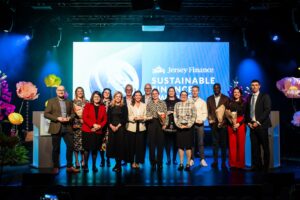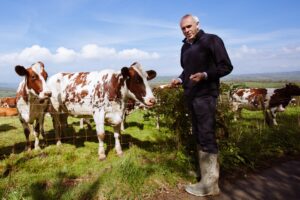
GERAINT RICHARDS
Mr Richards is the Head Forester for the Duchy of Cornwall. The following is a slightly abridged version of a speech delivered (virtually) to the Jersey Farming Conference, 2020.
He studied forestry at Bangor University, then spent four years subsequently working for the Forestry Commission in Kent and Sussex, then secured the position of Head Forester for the Duchy of Cornwall: ‘a job based in Cornwall, the county of my father and his ancestors, who were born in and a county with which I have always had a very special affinity.
That was in 1996, so nearly 25 years ago, which seems a long time in a single role, albeit a role that has been ever-changing. In terms of the history of the Duchy of Cornwall, 25 years is but a brief period. ‘
A little bit of background: the Duchy of Cornwall is a private estate, established in 1337, nearly 700 years ago, by Edward III in order to provide independence for his son and heir, Edward, the Black Prince. The focus of the Duchy then and throughout its long history has been to provide an income for the Duke of Cornwall: the eldest surviving son of the monarch and the heir to the throne.
The current Duke of Cornwall is HRH The Prince of Wales. He is the 24th Duke and the longest serving in history, with revenue from the Duchy funding his private, public and charitable activities and those of his children. HRH continues to be incredibly interested in and engaged with the Duchy. His enduring philosophy is to nurture and improve the estate in a sustainable and financially viable manner and therefore to be able to pass it on to future Dukes in a stronger and better condition.
The Duchy estate extends beyond the geographical boundaries of Cornwall, despite its name, and in fact it covers nearly 53,000 hectares (130,000 acres) of land across 21 counties, mostly in the west and south-west of England. Almost half of this area is on Dartmoor. The Duchy is best known as a rural estate, with its livestock and arable farms, forests, rivers, coastline, mines and quarries.
The Duchy also owns a number of historic properties, such as Restormel Castle, which one could say is the birthplace of the Duchy. It is managed in partnership with English Heritage. The Duchy also owns a nursery and garden centre at Lostwithiel. We own a number of residential and commercial properties, including pubs, such as ‘The Duchy Arms’ in London, as well as tower blocks, the Oval cricket ground and also Dartmoor Prison! Also we own the Isles of Scilly, and two Royal residences: Highgrove House and Llwynywermod, the Prince’s residence in Wales.
So it is a very diverse portfolio.
HRH is passionate about farming, gardens, trees, woodlands and forests. Highgrove was purchased by the Duchy in 1980 and it has been transformed through his vision. The farm underwent organic conversion early on. The gardens were created from an almost blank canvas and I can assure you that hedgerows, trees, woodlands and wild flower meadows have been crafted across the entire estate.
It is a privilege to engage with someone who is such an inspiring leader on so many key issues. For example, sustainable agriculture and forestry, climate change… HRH has spoken out for decades; he was talking about plastic pollution in the 1970s, and sometimes it seems that only now are many others catching up with or waking up to the realities of his concerns and the urgent need to change how we do things.
Much of the Duchy’s landholdings are tenanted, by tenant farmland. Apart from the Duchy nursery, it’s only my domain – 6,000 acres of woodland – that is an in-hand operation. Historically, as landlords, we have been able to try and influence our tenants as to what happens on Duchy farms, but we don’t have direct control.
In the past few years, however, we have embarked on a journey that we trust will prove transformational. The imminent changes in agricultural policies and subsidies, along with a need to deliver improved and enhanced environmental and social benefits, and linked to that, a reduction in emissions that contribute to climate change, the Duchy is now undertaking natural capital audits of all its farms across the 130,000 acres, using own employed natural capital advisors.
The seven natural capitals that we are considering are:
Access
Air
Biodiversity,
Historic features,
Landscape,
Soil
Water.
In summary, we identify the farms we’re going to audit – (there’s going to be an order to how we do the process) A desktop study is then done of what we can find out without having to go on to the farm, and will also involve plant life, we do arable plant surveys, and once all the information has been gathered, a visit is made to the farm to ground through some of these elements and to look at the lay of the land and at what is there and what can be done.
Then having got the baseline information the potential is drawn up: what this could like, and a draft resource management plan is put into place which is then shared with other Duchy colleagues and with the tenant to discuss, and eventually that is put into a final resource management plan, and via a memorandum of understanding with the tenant, the action will then be implemented. So the tenant is thoroughly engaged in all of this.
So this is now being done across the whole of the duchy. It started a couple of years ago it will roll on for a couple of more years until all the audits have finished.
I cannot pretend that we have all the answers when it comes to showing how that potential map can become a reality, or how the actions are going to be funded, but there are, of course, several emerging and exciting possibilities at the moment.
For instance, we have DEFRA’S new environmental land management scheme, which is a successor in England to the Environmental Stewardship, but we awaiting detail on that. There are going to be opportunities for carbon offsetting, there are going to be opportunities via the new Biodiversity Net Gain Bill, plus there will be investment by the landlord and the tenant simply to do what is right.
Have to be honest; we ourselves are working through this process at the moment. I trust we are on the front foot, and I suspect that by this time next year more detail will have been provided on some of these, particularly on the Biodiversity Net Gain.
So that is where we are as a landowner at the moment. But having said that I don’t want to give the impression that change is only now happening, because many Duchy tenants, with support from the Duchy have over many years now have sought to improve the sustainability of their agricultural operations and also to diversify their income streams by adding value to existing products or embarking upon new ventures.
Making a quick list of some of the activities our tenants are engaged in: some are growing specialist crops, flowers on the Isles of Scilly, special grain, quinoa, and sea buckthorn. Others are adding value. We’ve had a very successful business starting to make apple juice and ciders. Others are opening farm shops, often with restaurants. Others are taking advantage of our location in the south west with camping sites and rambling sites and holiday cottages, running livery yards and associated events.
I think the message is clear: simply being paid to farm for food is not the future. Whereas food security remains very important, we do need to re-define our productivity. It’s not simply going to be the future in terms of tonnes per acre, but in terms of the land’s ability by careful stewardship to produce food and timber, but also healthy soil, clean air, clean water, beautiful landscapes for people to enjoy, and to enhance their own health and wellbeing – multiple benefits from the same acre of land, and hopefully, therefore, multiple income streams to fund the delivery of these benefits.
I’m not a farmer, but the next decade is going to prove to be an exciting one for people like me who love trees. The importance of trees and woodlands, and forests, the many and varied environmental, economic and social benefits that they can deliver, has never been more widely recognised.
What a pathway for forestry! The sequestering and locking-up power of trees, locking up of atmospheric carbon, the production of sustainable material, what we can do with wood in terms of building now, replacing concrete and steel, what we can do with effectively wood fibre, the things we can make out of these building blocks of wood. Let alone all these other benefits: the benefits of soil structure, and regulating water flow, the high levels of biodiversity the woodland form, and the effects on human health and wellbeing, which have been widely recognised during Covid lock-down. How many people greatly appreciated, perhaps for the first time, the green space around them? The list is impressive.
Hence so many governments around the world, including the UK government and many local authorities have announced tree planting targets.
In Cornwall a forest for Cornwall has been announced. The local authority wants to see 8,000 hectares planted, to deal with carbon sequestration. National government has talked about 30,000 ha per annum as being a gain to help the UK reach net zero. ‘Tiny forests’ in Jersey; in New Zealand there is a billion tree programme, in Canada a 2 billion tree programme. We do need to increase tree cover. We do need to enhance and improve our tree cover in both urban and rural areas, because we are starting from a particularly low level of tree cover anyway, due to the historic clearance of woodlands, bearing in mind that the UK was once mainly tree-covered; yet just over the past 100 years ago we were down to less than 5% tree cover; it’s now up to 13%, which is well below the European average of about 35%.
So we need to increase our tree cover, but also because actually our current tree stock is being diminished by the alarming effects of climate change and pests and diseases.
In the Duchy, as HRH has mentioned, we have lost the elms as a result of Dutch Elm Disease. We are currently seeing the loss of all our ash due to Ash Die Back. We do need to plant more trees. But as with so many aspects of land management, the tree planting needs to be delivered not in a silo – it has to involve the farming community.
Historically in the UK there has always been a fence between the farm and the forest. And the only time the farmer and the forester meet is to decide who will pay for that fence when it needs to be replaced. We do need to break that fence down –metaphorically and sometimes literally. Remember, we have something in common, we work in the same sector, we just happen to be doing different jobs in that sector.
Within the Duchy’s Natural Capital Plan there are significant tree planting ambitions: field trees, hedgerow trees, riparian trees, orchards, coppices, woodland, forests… this will change the farming operation, but perhaps for the better: improving the soils, regulating the water, sheltering the stock sand the crops from the wind and the sun in what is going to be a difficult climate going forward, providing an opportunity for income generation activity.
I want to work with the Duchy tenants not against them, in order to create a truly resilient landscape that will be better for the planet, for society, but also for the farming operation.
I do think that Agroforestry, which I define as the integration of tree farming operation has a much bigger part to play.
There’s no doubt his HRH’s desire to see more trees planted. Last year, to commemorate 50 years from his 21st birthday, which is his 50th anniversary of effectively running the Duchy, a tree was planted on every Duchy farm across the country and a photo taken of the tenants by their tree: a wonderful social history of life in the Duchy in 2019.
Given the enormous threats presented by climate change, pests and diseases, we have to plant a more widely diverse range of trees – and that applies globally.
In a video message to the 2020 RHS Chelsea Flower Show, HRH said: ‘We are increasingly aware of the contribution that plants and trees make to our quality of life. Only when the enormity of the risks is known, will we take plant health and bio-security seriously, and enact rigid precautions to protect our jobs and countryside.’
In conclusion, the challenges facing us in the land-based sector are enormous, but so are the opportunities. There are going to be changes, perhaps radical changes, but for those changes to be truly effective, to work for us all, we need to collaborate in ways that we have perhaps struggled to do so to date. But I for one think conferences like this are an excellent opportunity to have that dialogue and build those relationships.’




